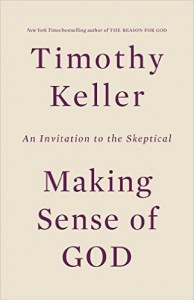 I closed my last post on Tim Keller’s new book Making Sense of God with a comment made on my post None and Fine With It:
I closed my last post on Tim Keller’s new book Making Sense of God with a comment made on my post None and Fine With It:
The evidence is the evidence, and science follows the evidence. Christianity comes to the evidence with a preconceived premise that there is a supernatural creator, which then biases all the conclusions that follow.
And later in response to another commenter:
But as to the supernatural – it is normal to adopt the null hypotheses.
“Bottom line, we are all living by faith.” No – we are not. Faith is an utter failure as an epistemology. You might live accordingly, but I do not – nor do many others.
Let’s see where Keller takes us in response. This question drives chapter two of the book: Isn’t religion based on faith and secularism on evidence?
Do we all live by faith?
In a rather elementary sense this is clearly true. We generally have faith in our reasoning capabilities and in our senses. We don’t believe that we live in a Matrix-like world. I’ve never seen this movie, but I have seen other shows, books, or movies with a similar premise. The characters perceive an illusion and believe it to be real. This doesn’t really address the meat of the question though, and Keller quickly moves on to more important points.
Whether we believe in God (or the supernatural more generally) or not, we all shape our lives around ideas that we believe on faith. In particular, the secular humanism of the Western world – dominant in the academic circles I frequent – is a faith based system.
Besides a set of beliefs about rationality, most secular people today also hold a set of ethical beliefs about the nature of human life. Many would describe themselves as “liberal humanists” who are committed to science and reason, to progress and the good of humanity, and to the rights, equality, and freedom of every individual human being. Secularity is marked by a call “to take active responsibility for the progressive improvement of the world …[to] work for the betterment of other humans, even strangers beyond our shores.”* And, it is argued, removing the influence of religion in the world will help us realize these values.
However, where did these values come from? Not only can none of these humanistic moral standards be proven empirically, but they don’t follow logically from a materialistic view of the world. (p. 41, *Keller’s source for the quote: Luc Ferry, A Brief History of Thought: A Philosophical Guide to Living pp. 72-73)
 Secular humanism can be a valid foundation for life – but it is a faith based foundation. Keller will argue that the humanist part of this philosophical approach to life derives from the influence of Christianity on Western culture. This is probably true, but whether it is or isn’t derived from Christianity, it is affirmed on faith not evidence.
Secular humanism can be a valid foundation for life – but it is a faith based foundation. Keller will argue that the humanist part of this philosophical approach to life derives from the influence of Christianity on Western culture. This is probably true, but whether it is or isn’t derived from Christianity, it is affirmed on faith not evidence.
If it was natural for the strong to eat the weak in the past, why aren’t people allowed to do it now? I am not, of course, arguing that we should not love one another. Rather, I’m saying that, given the secular view of the universe, the conclusion of love or social justice is no more logical than the conclusion to hate or destroy. (p. 42-43)
On what does this commitment to human rights depend? The community I inhabit at the University has strong views on certain ethical and moral issues. Some of these can be justified as necessary for the academic endeavor – for example an expectation of intellectual integrity and honesty. Others, such as a strong condemnation of sexual harassment or racism are harder to justify. After all, the academic endeavor thrived for decades, even centuries, in an atmosphere of both racism and sexism. Nonetheless we (most of us) share a belief that these behaviors are not to be tolerated. White supremacist postings are removed and condemned. Sexual harassment (even consensual relations with an undergraduate in one’s department) are grounds for serious sanctions and even dismissal.
The humanistic beliefs, then, of most secular people should be recognized as exactly that – beliefs. They cannot be deduced logically or empirically from the natural, material world alone. (p. 48-49)
In this context, belief and faith go together. Are beliefs are founded on some sort of faith – not on scientific empiricism.
Keller moves into a more detailed discussion of the Christian origins of the ideal of ‘natural’ human rights. The classical Greek and Roman worldview did not affirm the equality of all. Rather a natural hierarchy was assumed to hold, with some shaped to rule and others to serve. Such a view also shaped the ancient Near East. It carried through into much of the Christian West as well – but with something of a different bent. The powerful also had a moral responsibility for those who were in need. This set up a battle for ‘natural’ human rights and dignity grounded in the notion that all humans are created in the image of God. We can’t whitewash the failings of individuals and societies to live up to this ideal, but it still did exist. … It also drove the effort by some Christians to classify other races, especially black Africans, as subhuman. It drives the need to establish the beginning of life and personhood to either defend or disallow abortion.
If there is no transcendent reality beyond this life, then there is no value or meaning for anything. To hold that human beings are the product of nothing but evolutionary process of the strong eating the weak, but then to insist that nonetheless every person has a human dignity to be honored – is an enormous leap of faith against all evidence to the contrary. (p. 49)
 I don’t think that Keller gets this quite right. The evolutionary process is not a process of the strong eating the weak, it is a process of optimizing fitness for survival. Protecting the weak can have utilitarian value for the stronger species. A variety of symbiotic relationships in the animal world demonstrate this. Altruism, at least limited altruism, can also have survival benefit for a population. But this doesn’t change the larger point: to insist that every person has a human dignity to be honored is a leap of faith. It cannot be deduced empirically or proven scientifically. Human dignity is a moral designation not a utilitarian attribute.
I don’t think that Keller gets this quite right. The evolutionary process is not a process of the strong eating the weak, it is a process of optimizing fitness for survival. Protecting the weak can have utilitarian value for the stronger species. A variety of symbiotic relationships in the animal world demonstrate this. Altruism, at least limited altruism, can also have survival benefit for a population. But this doesn’t change the larger point: to insist that every person has a human dignity to be honored is a leap of faith. It cannot be deduced empirically or proven scientifically. Human dignity is a moral designation not a utilitarian attribute.
Keller concludes the chapter:
I hope by now my more skeptical readers will see that neither secularism nor Christianity has the main “burden of proof.” Western secularity is not the absence of faith but a new set of beliefs about the universe. These beliefs cannot be proven, but are not self-evident to most people, and have, as we shall continue to see, their own contradictions and problems just as other religious faiths do. …
Rather than unfairly asking only religious people to prove their views, we need to compare and contrast religious beliefs and their evidences with secular beliefs and theirs. We can and should argue about which beliefs account for what we see and experience in the world. We can and should debate the inner logical consistency of belief systems, asking whether they support or contradict one another. We can and should consult our deepest intuitions. (p. 53-54)
I like this chapter (for the most part) as an important introduction to the issues confronting us in the Western world. There are a few places where I would want to push back against Keller – but in the nature of furthering understanding and sharpening the discussion, not as a dismissal of his argument. We may get to some of these points in future chapters. This chapter should have as much impact on the Christian as on the skeptic. There are views we accept tacitly that are not foundational for Christian faith and should be discarded or reshaped. The quest for inner logical consistency cuts both ways. As a Christian and a scientist, I have to say that we can shoot ourselves in our collective feet by clinging to some unfortunate positions.
Are both Christianity and secularism based on faith?
How does the faith basis of each differ?
If you wish to contact me directly you may do so at rjs4mail[at]att.net
If interested you can subscribe to a full text feed of my posts at Musings on Science and Theology.





